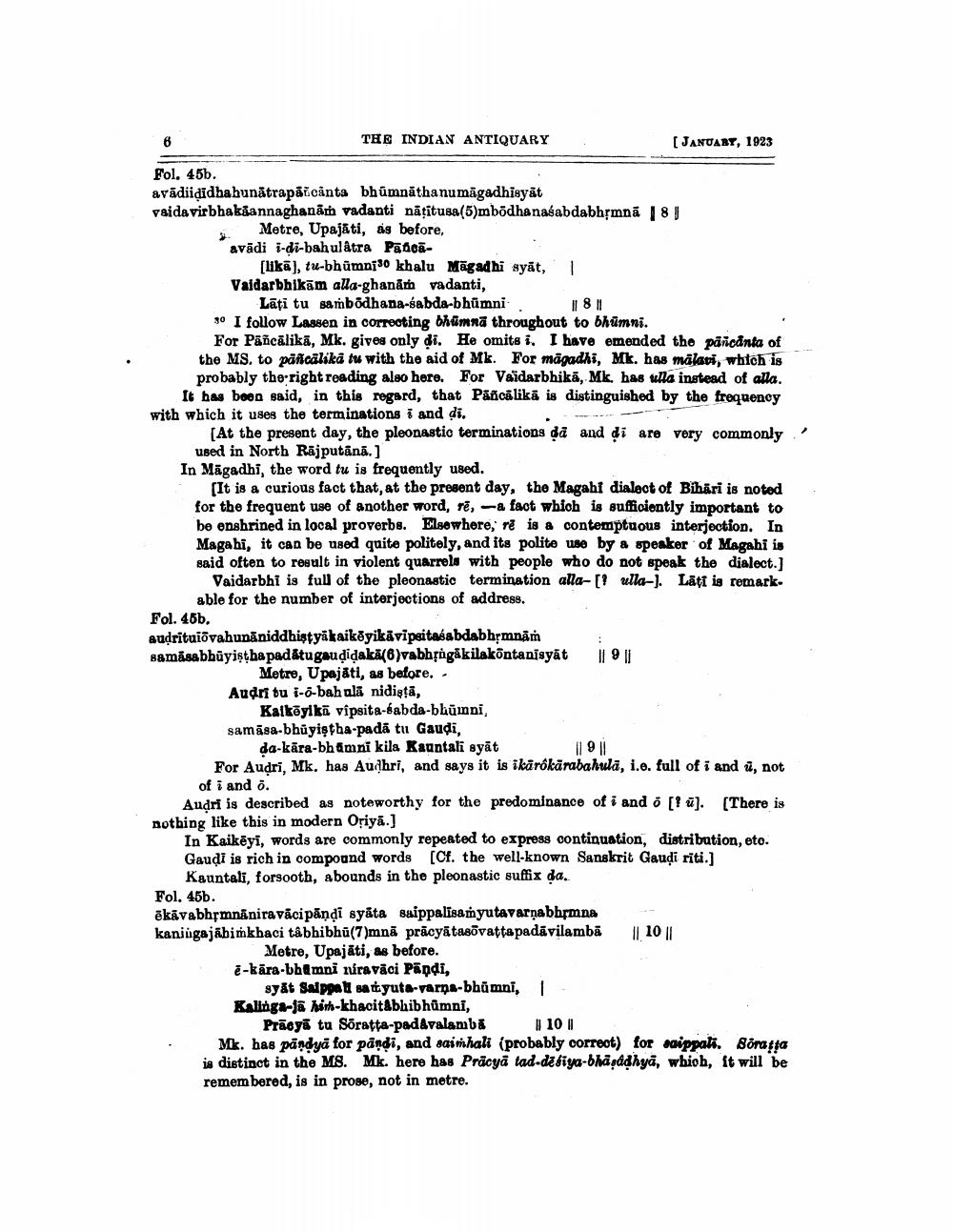________________
THE INDIAN ANTIQUARY
[ JANUARY, 1923
Fol. 45b. avādiididhabunātrapa cânta bhūmnāthanumagadhisyāt vaida virbhakkannaghanärh vadanti nāțitusa(5)mbödhanababdabhrmnā 18
Metre. Upajāti, as before, avādi i-di-bah ulatra Panca
[likā), tu-bhūmniso khalu Māgadhi syāt, Vaidarbhikām alla-ghana vadanti,
Lāți tu sambödhana-sabda-bhūmni. 1811 30 I follow Lassen in correcting bhumna throughout to bhūmni.
For Pañcālika, Mk. gives only di. He omits i. I have emended the pancanta of the MS. to pasicalika tu with the aid of Mk. For magadhi, Mk. has mälavi, which is probably the right reading also here. For Vaidarbhikā, Mk. has ulla instead of alla.
It has been said, in this regard, that Pancālikā is distinguished by the frequency with which it uses the terminations i and di.
[At the present day, the pleonastic terminations da and di are very commonly used in North Rājputānā. ] In Māgadhi, the word tu is frequently used.
It is a curious fact that, at the present day, the Magahi dialect of Bihari is noted for the frequent use of another word, rē, -a fact which is sufficiently important to be enshrined in local proverbs. Elsewhere, re is a contemptuous interjection. In Magabi, it can be used quite politely, and its polite use by a speaker of Magahi is said often to result in violent quarrels with people who do not speak the dialect.]
Vaidarbhi is full of the pleonastic termination alla-[i ulla-). Läti is remark.
able for the number of interjections of address. Fol. 46b. audrituiõvahunaniddhistyäkaikėyikāvipsitasabdabhrmnam Bamāsabhūyiṣthapad&tugaudidakä(6)vabhrógākilakontanisyat | 9 |
Metre, Upajati, as before. - Audri tu i-o-bah ala nidietā,
Kaikāyikā vipsita-sabda-bhūinni, samāsa-bhūyiştha-padā tu Gaudi, da-kāra-bhamni kila Kauntali syāt
1 9 11 For Audri, Mk, has Audhri, and says it is ikärôkārabahula, i.e. full of i and u, not of i and o.
Audri is described as noteworthy for the predominance of i and o [1ū]. (There is nothing like this in modern Oriya.)
In Kaikeyi, words are commonly repeated to express continuation, distribution, eto. Gaudi is rich in compoond words [Cf. the well-known Sanskrit Gaudi riti.)
Kauntali, forsooth, abounds in the pleonastic suffix da. Fol. 45b. ēkāvabhrmniniravácipāndi syata saippalīsamyutavarnabhrmna kanjigajābimkhaci tâbhibhū(7)mnā prācyātasővattapadāvilamba | 10 |
Metre, Upajāti, as before. e-kāra-bhemni niravāci Pandi,
syåt Salppal sa iyuta-varna-bhūmni, 1 Kalinga-ja hith-khacitábhibhūmni,
Prāoya tu Soratta-padávalamba | 10 | Mk. has pandya for pandi, and saimhali (probably correot) for saippali. Bonafta is distinct in the MS. Mk. here has Pracyā tad-debiya-bhasádhyā, which, it will be remembered, is in prose, not in metre.




